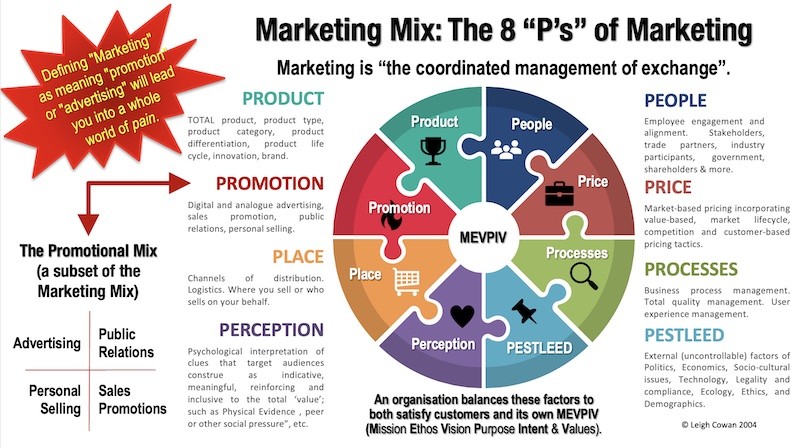I was the guest lecturer for the EMBA course at the Sydney Business School, University of Wollongong for several years. The topic title was marketing today, and I was interested to know how this group of business executives and tomorrow’s leaders defined marketing.
As the past-Chair of the Australian Marketing Institute, and a Certified Practicing Marketer, I was surprised at the range of definitions often raised in discussions with members of the institute and the diversity of opinions even on the board.
I started looking in the most visible locations when you undertake a search. Wikipedia says, “Marketing is the process of exploring, creating, and delivering value to meet the needs of a target market in terms of goods and services; potentially including the selection of a target audience; selection of certain attributes or themes to emphasize in advertising; operation of advertising campaigns; attendance at trade shows and public events; design of products and packaging attractive to buyers; defining the terms of sale, such as price, discounts, warranty, and return policy; product placement in media or with people believed to influence the buying habits of others; agreements with retailers, wholesale distributors, or resellers; and attempts to create awareness of, loyalty to, and positive feelings about a brand. Marketing is typically done by the seller, typically a retailer or manufacturer”.
A Google search of definitions of marketing produced the top result: Investopedia, which says, “Marketing refers to activities a company undertakes to promote the buying or selling of a product or service. Marketing includes advertising, selling, and delivering products to consumers or other businesses. Some marketing is done by affiliates on behalf of a company”.
Meanwhile, the online dictionaries were not very helpful.
The Merriam-Webster Dictionary defines marketing as “the process or technique of promoting, selling, and distributing a product or service.”. In contrast, Collins Dictionary defines it as “the organization of the sale of a product, for example, deciding on its price, the areas it should be supplied to, and how it should be advertised”.
Google also led me to this collection of definitions by Heidi Cohen, which is quite comprehensive. I picked through these to identify particular themes on marketing definitions that I used as a stimulus for the participants in the EMBA course.
But further down the page, beyond Heidi’s very comprehensive list, there were also 101 definitions of marketing by Jackson Cyprian, available on Elites Content, along with an exciting list of marketing definitions on SEOSandwitch compiled by Joydeep Bhattacharya.
In total, there are more than 200 definitions of marketing.
Please don’t get me wrong; I am not suggesting any of these are wrong; I am more interested in the diversity of views on what is the definition of marketing and one that, as a profession, we can rally around if there is any chance to have marketing recognised as a profession in the same way that we recognise lawyers, architects, doctors, accountants and the like.
Perhaps agreement on defining the marketing profession will be a step in the right direction to answer Mark Ritson’s recent question, “Shouldn’t an expert in marketing be trained in marketing?”. We explored this topic further during Mark’s podcast conversation on Managing Marketing.
Here are some definitions collated from Ms Cohen and Messers Cyprian and Bhattacharya for your consideration. But more importantly, I would like to hear your definition by leaving a comment at the bottom. Mine is here too. Right at the end.
The AMA says marketing is
According to the American Marketing Association (AMA) Board of Directors, Marketing is the activity, set of institutions, and processes for creating, communicating, delivering, and exchanging offerings that have value for customers, clients, partners, and society at large.
While the Chartered Institute of Marketing says…
Marketing is “the management process responsible for identifying, anticipating and satisfying customer requirements profitably.”
The father of modern marketing says…
Dr. Philip Kotler defines marketing as “the science and art of exploring, creating, and delivering value to satisfy the needs of a target market at a profit. Marketing identifies unfulfilled needs and desires. It defines, measures and quantifies the size of the identified market and the profit potential. It pinpoints which segments the company is capable of serving best and it designs and promotes the appropriate products and services.”
But Kotler also says…
Marketing is a “societal and managerial process by which individuals and organizations obtain what they need and want through creating and exchanging value with others.”
Kotler 1988
And even earlier, he says…
Marketing is the “analyzing, organizing, planning, and controlling of the firm’s customer-impinging resources, policies, and activities with a view to satisfying the needs and wants of chosen customer groups at a profit.”
Kotler, 1967
While Drucker says…
Marketing is “not only much broader than selling; it is not a specialized activity at all. It encompasses the entire business. It is the whole business seen from the point of view of the final result, that is, from the customer’s point of view. Concern and responsibility for marketing must therefore permeate all areas of the enterprise.”
Peter Drucker
Marketing is communication and connection
Marketing is traditionally the means by which an organization communicates to, connects with, and engages its target audience to convey the value of and ultimately sell its products and services.
However, since the emergence of digital media, in particular social media and technology innovations, it has increasingly become more about companies building deeper, more meaningful and lasting relationships with the people that they want to buy their products and services.
The ever-increasingly fragmented world of media complicates marketers’ ability to connect and, at the same time, presents an incredible opportunity to forge new territory.
Julie Barile – Vice President of eCommerce, Fairway Market
Is the prelude to sales
Marketing includes research, targeting, communications (advertising and direct mail) and often public relations.
Marketing is to sales as plowing is to planting for a farmer—it prepares an audience to receive a direct sales pitch.
Mary Ellen Bianco – Director Marketing & Communications, Getzler Henrich & Associates LLC
Is managing the customer experience
Professor Philip Kotler explained that marketing was “meeting the needs of your customer at a profit.”
For me that definition extends beyond just communicating product features. Marketers are responsible for a 360-degree experience. For example, in the social media world, a customer’s Twitter needs may differ from her needs to “play with the brand” in terms of a social game promotion.
Every customer touch-point, from customer service to sales to accounting and more, is part of the “new marketing.”
Toby Bloomberg – Bloomberg Marketing/Diva Marketing
Marketing is simply A, B, C
Marketing when done well is (a) the strategy of the business – its value proposition, go-to-market strategy, and brand positioning and image to the world.
Marketing when not done well is (b) an endless checklist of advertising and promotional to-dos that can never be completed.
Marketing in the twenty-first century must be (c) largely, but not entirely, measurable and accountable around driving business goals.
Marketing when done brilliantly is driven by (a) includes a small, disciplined subset of (b), and is steeped in a culture of (c).
Matt Blumberg – Chairman and Chief Executive Officer, Return Path
Marketing is brand building.
Marketing is building your brand, convincing people that your brand (meaning your product/service/company) is the best and protecting the relationships you build with your customers.
Marjorie Clayman, Director of Client Development, Clayman Advertising, Inc.
Marketing is all about growth.
Modern marketing is the ability to harness the full capabilities of the business to provide the best experience for the customer and thereby drive growth.
Sarah Armstrong, Dianne Esber, Jason Heller, and Björn Timelin, McKinsey & Company
Marketing is brand storytelling.
Marketing is how you tell your story to attract customers, partners, investors, employees and anyone else your company interacts with.
It’s the script that helps users decide if they’ll welcome you into their lives as a staple, nice-to-have or necessary annoyance.
It’s the way that everyone interacts with your brand.
It’s impression, first, last and everything in between.
Jeff Cutler – Executive Vice President and General Manager, Vitals.com
Marketing is everything
Marketing is making connections between customers with your products, brand(s) and business, such that they are likely to buy from you.
Or as Regis McKenna said, “Marketing is everything.”
Sam Decker – Co-founder and Chief Executive Officer, Mass Relevance
Marketing is outward communications
Marketing is essentially involved in outward communication, in promoting the corporate goals of the company it is serving. It is the process through which companies accelerate returns by aligning all communication objectives (advertising, marketing, sales, etc), into one department to more efficiently achieve the overall corporate goals.
Antoine Didienne – President, Vavavida
Marketing is a contest
Marketing is a contest for people’s attention.
Seth Godin
Marketing is creating customer loyalty
Marketing is simply put as the products that don’t come back and consumers that do.
Steve Dawson, President, Walker Shortbread Inc
Marketing is MUCH more than just Marketing Communications
Marketing is the holistic and coordinated management of all the elements involved in the exchange.
Leigh Cowan – CEO, Leadership Empowerment
Marketing is not sales
Marketing is branding, naming, pricing, and the bridge between paid and earned media. It is NOT sales.
Gini Dietrich – Chief Executive Officer, Arment Dietrich, Inc.
Marketing turns needs into profit.
Marketing is “the process by which a firm profitably translates customer needs into revenue.
Mark Burgess
Marketing is customer focused.
Marketing today is finally customer-focused. Social media made that happen. Markets are once again conversations. Marketing is about knowing the market, creating the right product, creating desire for that product and letting the right people know you have it. The old adage that says, “If you build a better mousetrap people will beat a path to your door” doesn’t hold true without marketing. You might indeed have a better mousetrap, but if people don’t know you have it, and they don’t know where your door is, there will be no path beating and no conversation going on.
Sally Falkow – APR, PRESSfeed
Marketing is a list of disciplines.
Marketing is the umbrella term covering research, branding, PR, advertising, direct response, promotions, loyalty, demand generation, etc.
Anne Holland – Publisher, WhichTestWon.com
Marketing is buzzwords
Marketing should be channel agnostic, data-driven and customer-centric. This provides measurable results leveraging the marketplace at large; responding to consumer/business interests and needs.
Sue R.E. Germanian, SVP and Chief Communications Officer, DMA
Marketing is a conversation.
Marketing is the conversation between a company or brand and a consumer that ultimately leads to brand recall, preference or a transaction. In today’s socially networked world, that conversation is being disintermediated by word-of-mouth referrals. Traditional marketers will have to work harder to get ahead of and to influence this trend.
Josh Glantz – VP & General Manager, PCH Online-Publishers Clearing House
Marketing is storytelling
Marketing is anything you create or share that tells your story.
Ann Handley, Chief Content Officer, MarketingProfs
Definitive Marketing
Marketing is ultimately responsible to create enterprise value via the brand, the face of the business strategy. To do so, marketing identifies the target, attractive high-growth segments. Marketing drives the organization to define the single-minded, differentiated brand value proposition and deliver on it every single day across every touch point. Marketing ensures the delivery of a compelling, differentiated offer to that target and proposition. And, marketing measures and improves the consumers/businesses/partner satisfaction and the brand health and strength. Marketing is the single point of accountability for growth, identifying and delivering on new customers, new offerings & new market profitable growth.
Cathy Halligan – SVP, Sales & Marketing, PowerReviews
Marketing is knowing your customer.
Marketing is about knowing the customer (whether current or prospective) so well that there is no question I will read your newsletter and share it with your friends, that I will carry a frequent buyer card in my wallet, and that I already interact on your Facebook page.
Ari Herzog – Policy and Communications Specialist
Marketing is art and science.
Marketing is the art and science of creating, delighting and keeping customers, while making a profit and building enterprise value. Marketing integrates, formally or informally, many disciplines and every organizational function. Marketing should embrace the highest ethical standards, respect the environment, and strive to make the world a better place.
Max Kalehoff – Vice President of Marketing, Clickable
Marketing is making a profit.
Profitable marketing is reminding likely-to-buy prospects of the value of your products/services in meeting their needs, over and over, at an acquisition cost lower than your allowable acquisition cost.
Jerry Kaup – MemberLink.org
Marketing is building consumer preference.
Marketing is the practice of increasing awareness, consideration, purchase/repurchase and preference for a product or service through consumer-driven benefits, advertising, packaging, placement, pricing and promotions. Historically, marketing was a one-way interaction but is increasingly becoming two-way through the use and influence of social media and viral marketing which is often fuelled by the company offering the good or service.
Robin Korman, SVP, Global Loyalty and Partnerships, Wyndham Hotel Group
Marketing is multifaceted
Marketing is a strategic and tactical multifaceted process that supports sales as well as customer service and retention. The primary stages include identifying target audiences, developing a marketing/communications strategy that usually includes several methods and channels (e.g. advertising, PR, content, events/digital print, broadcast), measuring and assessing results, and constantly refining the process based on learnings and marketplace developments. Marketing can also become a feedback loop between an organization and its customers and prospects that helps to inform and shape the business going forward.
Rebecca Lieb, Author of The Truth About Search Engine Optimization
Marketing is strategic communications.
Marketing is strategic communications and promotions delivered in a mix of forms, such as advertising, public relations, and direct marketing, through multiple online and offline channels, to acquire customers, retain customers, increase share of wallet and shorten the sales cycle.
Valerie Oben – President, Foxboro Consulting Inc.
Marketing IS everything
Marketing is everything a company does, from how they answer the phone, how quickly and effectively they respond to email, to how they handle accounts payable, to how they treat their employees and customers. Done right, marketing integrates a great product or service with PR, sales, advertising, new media, personal contact. In other words, marketing is not a discipline or an activity – it is everything a company is – at least if the company wants to be successful.
B.L. Ochman – President, What’s Next
Marketing is creating value.
The modern definition of marketing is the practice of creating value for the mutual benefit of meeting consumer needs and business objectives. In action, that means knowing and meeting target audience/community information discovery, consumption and sharing behaviours with relevant and timely communications throughout the customer lifecycle. Those communications and relationships influence consumer behaviour to drive revenue outcomes.
Lee Odden – Chief Executive Officer, TopRank Online Marketing
Marketing is attracting and connecting.
Marketing is all activities designed to attract and connect customers with the products and services they need. Includes inbound and outbound marketing tactics across all channels – one-to-one and one-to-many. Ideally, marketing fosters a long-term relationship, includes the entire customer brand experience – i.e. support and customer service. Marketing starts with the design of the product itself and extends through post purchase.
Patrick Prothe – Marketing Communications Manager, Viewpoint Construction Software
Marketing is solving pain points.
Marketing is identifying the pain points of your customers, and developing content and processes to best solve those pain points – which ultimately makes it easier for your customers to buy or stay customers.
Joe Pulizzi – Founder, Content Marketing Institute
Marketing is the 4Ps
Marketing is the combination of messages and programs (the 4 P’s–product/packaging, price, placement and promotion) that drive shoppers to choose your product or service over someone else’s.
Charlene Samples – Director of Marketing, Heartland Sweeteners
Marketing is Guerilla
Marketing is “any contact that your business has with anyone who isn’t a part of your business. Marketing is also the truth made fascinating. Marketing is the art of getting people to change their minds. It involves collaborating with business partners in the Industry and building lasting relationships that yields profit.”
Jay Conrad Levinson coined the Guerilla marketing, 1984
Marketing drives sales
Marketing is inextricably linked to sales and unless it drives a trial or sale, the effort should not be labelled ‘marketing.’ The critical steps in marketing include defining what is currently known about a business (trends, regulations, target audience, competitors), who are the target users or buyers, what are the measurable business objectives in terms of where to take that business, what is the plan to get there and what are the measures of success of initiatives defined to reach those objectives. This marketing approach can be applied whether the objective is expanding a current business or entering new markets. Each step in the marketing process is meant to move the user or buyer closer to making a buy decision.
Alexandra Tyler – VP, Branded and Social Media Marketing, Citi Global Transaction Services
Marketing builds brand relationships.
Marketing builds relationships between consumers and brands. The many disciplines that go into the process, together create a brand personality designed to be compatible with the target. Marketing romances the consumer in the hopes of establishing a long-term commitment. This takes persuasion and nothing moulds opinion like the third-party endorsement power of PR. As Bill Gates says “If I was down to my last dollar, I’d spend it on PR.”
Deborah Weinstein – President, Strategic Objectives
My definition of marketing?
Marketing is the management of an organisation’s (brand’s) face to the market to deliver the objectives of that organisation (brand).
What do you think?
What is your definition of marketing?
Let me know your definition of marketing in the comments below. Let’s advance the conversation to see if, as a profession, we can agree on what is marketing.
TrinityP3’s Marketing Transformation Practice strikes at the heart of our reason for being: driving enhanced marketing performance via alignment of process and commercial purpose.






2 thoughts on “What is the definition of Marketing?”
Good lord. What a heap of tosh. No wonder our profession is in disarray. Most of us think it's a synonym for sales, or an umbrella term for communications, or everything. I'm sad that this is actually an important debate. It shouldn't be. But it is. My definition. Tosh or otherwise, you be the judge is.
Marketing's role in an organisation is to affect the behaviour of consumers (or another word for end users if you must) in order to create value for the business in both the long and short term.
Ready, set, critique.
Huzzah. I've found something I disagree with @markritson about. I was starting to think he was just a smarter, better looking version of me. But that definition to me sounds like what a business does. Not just the marketing bit. I'm all for marketing having a bigger role. But I think this lacks specificity. Even if I am wrong, I am just going to revel in my new found point of tension with my alter ego.
Comments are closed.